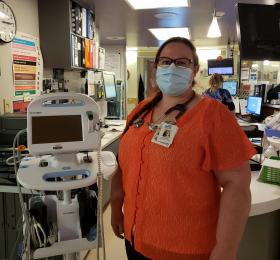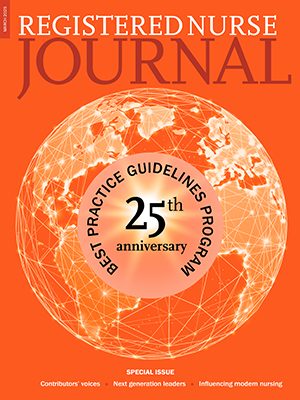Letter to the editor
Sudbury RN and member Maria Casas writes about the importance of Nursing Week in a letter to the Timmins Daily Press (May 10).
In 1971, the International Council of Nurses (ICN) designated May 12, Florence Nightingale’s birthday, as International Nurses Day. In 1985, in recognition of the dedication and achievements of the nursing profession, the Canadian minister of health proclaimed the second week of May as National Nursing Week in Canada.
Nightingale is best known around the world as the ‘Lady with the Lamp’ who nursed British soldiers during the Crimean War and turned nursing into a profession. But she was also much more than that. She was an activist, social theorist and author whose advocacy to improve health and sanitation for British Army soldiers, and writings on hospital planning and organization, laid the foundation for nursing’s emphasis on social determinants of health today. Nightingale published more than 200 books, reports and pamphlets.
It is important to highlight the significant impact nurses have in all areas during this particularly demanding time in history.
- Public health nurses are overseeing the tracing of COVID-19 contacts to alert those at risk and minimize disease spread.
- Nurses in long-term care are managing ever-changing directives in regards to screening and cohorting of residents to keep them safe.
- Acute care nurses are providing supportive care to those infected to reduce complications, while keeping infections from spreading.
- Nurses in the community are assisting with the rollout of vaccines and helping those COVID-19 patients who are ill, but not in need of hospitalization.
These represent just a few examples of the contributions nurses are making to the fight against COVID-19, above and beyond their usual professional responsibilities.
RNAO’s Sudbury & District Chapter acknowledges the influence of all nurses and thanks them, and their care partners, for the important work they do. Nursing Week gives nurses across the world the chance to celebrate and to keep Nightingale’s work alive by keeping Ontarians healthy, and caring for them when they’re ill.
Hamilton-area hospitals set bar on self-isolation pay
Ontario hospitals in Hamilton, Niagara, Brant, Haldimand and Norfolk counties are providing staff with pay if they need to self-isolate due to potential contact with a COVID-19 patient. This is a move that RNAO actively pushed for. “It was never right to put the burden of sick time or isolation time on the backs of nurses that are putting themselves on the line,” says CEO Dr. Doris Grinspun. This much-needed compensation will help control the transmission of COVID-19 and protect staff and patients, she adds. The policy change comes after RNAO’s strong advocacy for compensation, and following a letter from an emergency physician group at Hamilton Health Sciences, which wrote to the minister of health about its “deep concern” that nurses weren’t being paid during self isolation. (CBC News, Feb. 17)
NAN Hope program addresses Indigenous mental health during COVID-19
The Nishnawbe Aski Nation (NAN) Hope program began in August 2020 to help provide culturally-appropriate mental health support to all NAN citizens. The number of active clients in the program is 317 (as of March 3), and continues to increase each week. Nurse practitioner and NAN COVID-19 Task Team Chair Mae Katt says the pandemic has affected the community in a variety of ways. “The NAN COVID-19 task team works with the nation leadership to protect the communities from the impacts of COVID-19. We do know the impacts are affecting many parts of the community.” According to a Canadian Mental Health Association (CMHA) survey conducted in December 2020, 54 per cent of Indigenous people have experienced deteriorating mental health during the second wave of COVID-19. This is up from 41 per cent during the first wave. (Toronto Star, Jan. 21)
No place for racism in nursing or anywhere
Keisha Jefferies, a PhD candidate in the school of nursing at Dalhousie University, says racism is embedded in nursing education. Jefferies says cases studies in curriculum content often present Indigenous patients as struggling with alcohol dependency and refer to Black people as often having poor dental hygiene. “You’re attaching a lot of these assumptions to groups.” Racism in nursing curriculum is an issue RNAO has recognized and wants to eliminate. The association’s Black Nurses Task Force (BNTF), which was launched in June 2020, is tackling this and other issues of discrimination in the profession (read more about the BNTF in our Fall 2020 issue). The task force is co-chaired by RNAO Immediate Past-President Dr. Angela Cooper Brathwaite and nurse practitioner (NP) Corsita Garraway. Cooper Brathwaite says, “Racism is a learned behaviour. If people are open and willing to listen and understand where other people are coming from, [then] they too… would be allies of people of colour.” (University Affairs, Jan. 15)
Windsor ICU staff exhausted as second wave takes hold
Staff are beginning to feel exhaustion as they continue to fight COVID-19 at Windsor Regional Hospital. Many COVID-19 patients in the ICU are on ventilators. The medical director of the ICU says that despite their best efforts, 40 per cent of these patients who need a ventilator in Windsor-Essex die. RN Karen Riddell, vice-president of critical care at the hospital says that her and her team need to prepare for more people with COIVD-19 need ICU care. “We’re preparing to be at a critical level. We’re trying to avoid getting to chaos but we’re very busy, we’re very worried about what’s to come,” says Riddell. Staff in the ICU continue the difficult work caring for vulnerable COVID-19 patients while hoping for an end to the pandemic. (CBC News, Jan. 20)
Trenton NP first to receive most-responsible-provider designation
Johanna Leonhardt is the first NP at Quinte Health Care (QHC) to fill the role of 'most-responsible-provider' (MRP), a designation that means she is able to practise to her full scope (read more about RNAO’s NP Task Force report on scope of practice in this issue). In fact, she’s one of only a few NPs across the province that has the title. Leonhardt works in the regional complex continuing care unit at Trenton Memorial Hospital. “It’s pretty exciting,” she says of the new designation. “I have been really well-received here, not only by the patients themselves, but by all of the staff, including the physicians. I’m very thankful that I have a lot of support around me.” QHC’s chief nursing officer and vice-president Carol Smith Romeril says she is delighted by the change: “This has been a goal for almost my entire career.” Leonhardt is happy to be able to provide more for her patients. Allowing NPs “…to work to their full scope can only be beneficial for the health-care system,” she says. “It gives me not only that responsibility, but there’s an expectation there that I step up to the plate and provide top-quality care for these patients.” (Belleville Intelligencer, Dec. 14)
St. Joseph's Health System CEO called out for vacationing during COVID-19 stay-at-home order
St. Joseph’s Health System in Hamilton fired its CEO Dr. Tom Stewart after it was made public he had vacationed in the Dominican Republic despite government advisories to stay at home late last year. Stewart apologized for taking the trip. RNAO President Morgan Hoffarth spoke out: “We have been working tirelessly day-in and day-out. I work at a nursing home in an outbreak, so for front-line health-care workers to be at work every single day and not able to take a day off, and to have leaders who are travelling internationally or abroad for pleasure is not something I think people will respond favourably to.” Stewart was also removed from his position as CEO of Niagara Health. Several other high-profile politicians and health-system leaders in Ontario and other parts of the country were identified earlier this year for making similar, unfortunate choices to ignore public health advice. (CBC News, Jan. 5)
Letter to the editor
RNAO CEO Dr. Doris Grinspun’s letter about the COVID-19 vaccine rollout appeared in the Toronto Sun (Feb. 12). For more on the province’s shortcomings as they relate to the rollout, read Conversations with members in this issue.
Glad to see Ontario’s COVID-19 science table is learning from Israel, the world’s leader on per capita vaccination. I know the Israeli health system as I practised there for a decade and also have most of my family there, all of whom are already vaccinated. There are three fundamental things we can learn from Israel’s vaccination success. First, the vaccination rollout is entirely delivered by nurses working in primary care, which is the anchoring sector of Israel’s four health-maintenance organizations (HMO). Second, Israel never relied on hospitals to store vaccines or to inoculate its citizens. Instead, they have zealously protected hospitals to care for the very sick. Third, Israel’s rollout in order of priority was all health-care workers, followed by nursing homes residents, and then everyone 60 and older. Ontario can get it right too, by moving away from hospital-delivered vaccinations to our community sector: Public health, primary care, home care, and pharmacies, deploying the thousands of nurses, physicians and pharmacists working in community care and relying on community-based tried and true distribution systems for vaccinations. It would accelerate a provincewide COVID-19 rollout plan 24-hours-a-day, seven-days-a-week. We must follow Israel’s third and important lesson and vaccinate everyone over the age of 60 and fast, before the new variants claim their lives. Let’s get ready to roll up our sleeves and get the vaccine for the sooner the healthier we will all be.
Stefanie Van Nguyen
Sept. 10, 1995 to Jan. 21, 2021
This past year has been one of tremendous loss. COVID-19 has taken the lives of patients, friends, family members and colleagues. But it’s not just the effects of the virus on our physical health that is to blame for this unprecedented loss. The impact of the pandemic on mental health is undeniable.
The nursing community was shocked by the tragic loss of RN Stefanie Van Nguyen, 26, who died by suicide on Jan. 21, 2021. Van Nguyen was a registered oncology nurse at Oakville Trafalgar Memorial Hospital. She also worked as an occupational health nurse at Humber River Hospital. She was a dedicated RN who cared deeply for her patients and her co-workers and was well-liked by her colleagues.
RNAO CEO Dr. Doris Grinspun told Global News that Nguyen’s family told her that she was very giving and was always the last one to leave work in order to help others. On social media Van Nguyen’s partner, Jason Parreno described her as “a light in this world.” In another post, friend and fellow nurse Amanda Jara urged her colleagues to take care of their mental health. “This career is endless and it will always be waiting there for you to come back when you’re ready,” she writes.
Grinspun says that this pandemic has been especially tough on frontline health-care workers. “It’s unsustainable. It breaks the souls of our people and it’s exhausting them to no limit.” RNAO began its open forum series in February to provide nurses with a space to discuss their mental health and how they are coping during the pandemic. In January, RNAO launched a wellbeing survey for RNs, NPs and nursing students to get a pulse on how nurses are feeling during this pandemic. Early results from the survey were released at a webinar on March 8.
If you are experiencing mental health issues, know that you are not alone. Please reach out for help. Visit our COVID-19 portal for a list of resources and supports for care providers coping with depression, stress and anxiety. Seek support from a health professional because you are loved and we need you.
Bladder and bowel BPG now available
RNAO has published its newest best practice guideline (BPG) to replace two former BPGs on bladder and bowel management. A Proactive Approach to Bladder and Bowel Management in Adults, Fourth Edition, provides evidence-based recommendations for supporting adults who live with urinary incontinence, fecal incontinence and/or constipation. The recommendations are applicable to all practice settings where people are accessing services for these conditions. The new BPG replaces Promoting Continence Using Prompted Voiding and Prevention of Constipation in the Older Adult Population, both of which were last updated in 2011. Learn more and access the free download of the BPG here.




